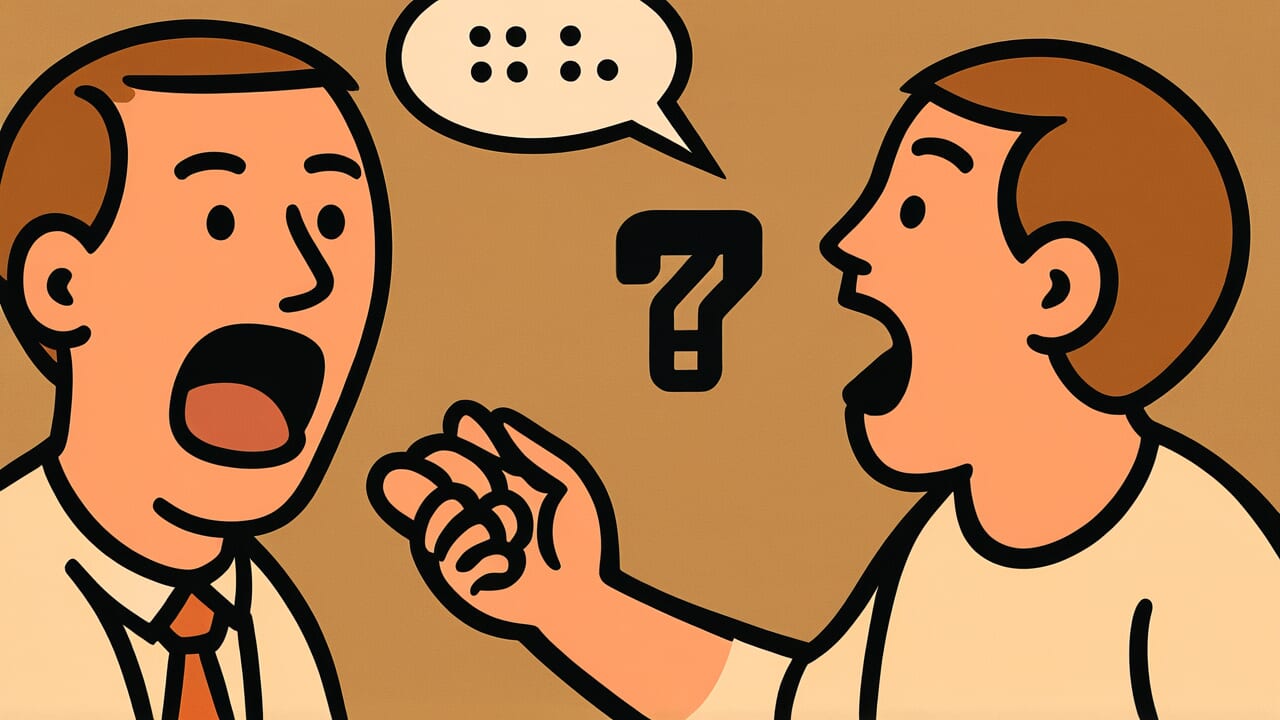How to Read “Raising your voice for a fight after sizing up your opponent”
Aite mite kara no kenka-goe
Meaning of “Raising your voice for a fight after sizing up your opponent”
“Raising your voice for a fight after sizing up your opponent” is a proverb about cowardly behavior. It describes people who suddenly act tough and aggressive only after they know someone is weaker than them.
These people are quiet and obedient around strong people. But they act bossy and mean to people in weaker positions. The proverb criticizes this fake toughness.
People use this saying to criticize others who act this way. It’s also used as a warning to yourself not to behave like this.
You see this behavior in many places. Some workers are polite to their boss but rude to new employees. Some customers are mean to store workers but nice to their friends.
This kind of behavior still happens a lot today. But this proverb is still used because people agree it’s shameful to act this way.
The proverb teaches us an important lesson. True strength means treating everyone fairly and honestly, no matter who they are.
Origin and Etymology
We don’t know exactly when this proverb first appeared in writing. But experts think it came from everyday life during the Edo period (1603-1868).
Let’s break down the phrase. “Aite mite kara” means checking out your opponent first. “Kenka-goe” means an aggressive, threatening voice.
Together, it describes someone who watches and calculates before deciding how to act. This shows a sneaky side of human nature.
During the Edo period, Japan had a strict class system. But even among regular townspeople, power relationships were complicated.
People saw others change their behavior all the time. In business deals and neighborhood life, they watched people judge others before choosing how to act.
The word “kenka-goe” (fight voice) is really interesting. It’s just a voice, not an actual fight. That’s the key point.
People only use this loud, aggressive voice with weak opponents. They never use it with strong ones. The proverb captures this cowardly behavior perfectly by focusing on the “voice.”
This saying probably spread by word of mouth. It shows how regular people understood human weakness and cowardice.
Usage Examples
- He can’t say anything to the department head, but he lectures new employees like he’s so important. That’s really “raising your voice for a fight after sizing up your opponent.”
- That person is only rude to store workers. It’s embarrassing to watch—a perfect example of “raising your voice for a fight after sizing up your opponent.”
Universal Wisdom
“Raising your voice for a fight after sizing up your opponent” points out a basic human weakness. Why do people act obedient to strong people but mean to weak people?
The answer is self-protection. People naturally avoid those who might hurt them. They only show aggression to people who seem safe.
This makes sense as a survival strategy. But there’s more going on. People are also trying to hide their own weakness.
By acting tough with weak people, they try to feel strong. It’s a way to ignore their own weakness.
Someone who can’t speak up to their boss feels scared. They don’t want to admit this fear. So they act extra harsh to people below them.
This makes them feel less weak. They’re lying to themselves about who they really are.
This proverb has been passed down for hundreds of years. That’s because this human weakness exists in every time period.
Our ancestors recorded this behavior as something shameful. That’s really important. They knew humans have weaknesses.
But they also knew one thing clearly. Taking out your weakness by bullying others is never okay. That’s the strong message of this proverb.
When AI Hears This
The person who starts a fight first actually traps themselves. Game theory calls this “strategic commitment.” When you declare “I’ll never back down,” you can’t back down anymore.
If you do back down, you lose credibility. So the moment you act tough, you lose options.
Meanwhile, the person who waits and watches has a huge advantage. They can learn if the opponent is truly strong or just bluffing.
Are they serious about fighting, or just threatening? Information economics can calculate the value of having this information.
After gathering information, they can choose: fight, retreat, or how hard to respond. This “second-mover advantage” is powerful.
Here’s the interesting part: the person who yells first looks strong but actually becomes weak. It’s a reversal.
There’s a famous model called the Chicken Game. The driver who locks their steering wheel seems to win. But if the opponent really charges forward, they lose.
This proverb understands that danger. By waiting, you let your opponent lock themselves in. Then you can use their rigidity against them.
This is actually an advanced strategy that weak people can use.
Lessons for Today
This proverb teaches us to check ourselves constantly. Do we change our attitude based on someone’s position? We need to watch for this.
In modern society, power relationships are complicated. There are boss-worker relationships, customer-service relationships, and anonymous relationships on social media.
We might be “sizing up opponents” and changing our behavior without even realizing it.
What’s important is staying honest with everyone. Treat your boss, your coworkers, and store workers with the same respect.
This isn’t easy. When you’re stressed, you might want to take it out on someone in a weaker position.
But that’s exactly when you should remember this proverb. Your true strength shows in how you treat weak people.
Trying to be fair and kind to everyone is real courage. It shows your character as a person.
Admit your weaknesses, but still try to be honest. That one step will help you grow into a better person.



Comments